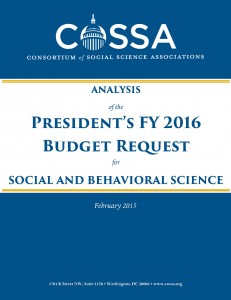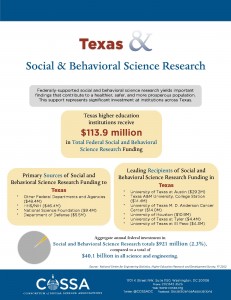Issue 03 (February 24)
COSSA Washington Update, Volume 34 Issue 3
Featured News
- COSSA Annual Meeting & Advocacy Day, March 9-10 – Still Time to Register!
- COSSA’s Analysis for the President’s FY 2016 Budget Request
COSSA in Action
Congressional News
- Congress Introduces Flurry of “Health” Bills
- Senators Release Innovation for Healthier Americans Report, Request Feedback
- HELP Committee Approves Strengthening Education through Research Act
Federal Agency & Administration News
- New NIJ Director Sworn In
- NSF Releases Report on Women, Minorities, and Persons with Disabilities in Science and Engineering
- NCHS Seeks Health Statistics Service Fellow
COSSA Member Spotlight
COSSA Annual Meeting & Advocacy Day, March 9-10 – Still Time to Register!
The 2015 COSSA Annual Meeting and Social and Behavioral Science Advocacy Day is fast approaching. Join us on March 9-10, 2015 in Washington, DC for a day of discussion on federal issues impacting social and behavioral science research. The preliminary program is available here. Visit the COSSA Annual Meeting page for full details.
COSSA’s Analysis for the President’s FY 2016 Budget Request
 President Obama released his fiscal year (FY) 2016 budget request to Congress on February 2, officially kicking off the FY 2016 appropriations process. COSSA has released its analysis of the President’s budget request. The 62-page report provides funding details for all federal departments, agencies, and programs important to social and behavioral science research. It outlines the President’s funding proposals as they compare to current (FY 2015) levels. In addition, the document serves as a helpful catalog of social science programs and initiatives across the federal government.
President Obama released his fiscal year (FY) 2016 budget request to Congress on February 2, officially kicking off the FY 2016 appropriations process. COSSA has released its analysis of the President’s budget request. The 62-page report provides funding details for all federal departments, agencies, and programs important to social and behavioral science research. It outlines the President’s funding proposals as they compare to current (FY 2015) levels. In addition, the document serves as a helpful catalog of social science programs and initiatives across the federal government.
COSSA Develops State by State Funding Fact Sheets
 COSSA has developed a series of fact sheets describing the amount of federal funding for social and behavioral science that is provided to each state. These fact sheets are intended to illustrate the economic impact of federal investment in social and behavioral science research, including as a driver for innovation at universities across the country. While federal investment in social science research is significant ($921 million), it pales in comparison to the total amount of annual federal funding for all of science and engineering ($40.1 billion).
COSSA has developed a series of fact sheets describing the amount of federal funding for social and behavioral science that is provided to each state. These fact sheets are intended to illustrate the economic impact of federal investment in social and behavioral science research, including as a driver for innovation at universities across the country. While federal investment in social science research is significant ($921 million), it pales in comparison to the total amount of annual federal funding for all of science and engineering ($40.1 billion).
COSSA & NDD Partners Call for End to Sequester
On February 18, COSSA joined more than 2,100 organizations on a letter to Congress calling for an end to sequestration in fiscal year (FY) 2016 and protection of nondefense discretionary (NDD) spending from additional cuts. The letter was organized by NDD United, a broad coalition of organizations that have banded together to combat cuts to NDD funding. Participants represent sectors from science and health to environment, justice, and civil rights.
Congress Introduces Flurry of “Health” Bills
Over the last few months, a number of bills in support the National Institutes of Health (NIH) have been introduced by members of the 114th Congress. These authorizing bills would address various aspects of NIH, including increasing the amount of funding that can be appropriated to it.
Read on for details on the follow bills:
New NIJ Director Sworn In
On February 9, Dr. Nancy Rodriguez (Arizona State University) was sworn in as director of the National Institute of Justice (NIJ). Rodriguez’s research expertise includes topics such as collateral consequences of imprisonment; issues pertaining to race, ethnicity, crime, and justice; and longitudinal studies of families affected by maternal/paternal incarceration. She was appointed by President Obama in October 2014.
NSF Releases Report on Women, Minorities, and Persons with Disabilities in Science and Engineering
The National Science Foundation (NSF) National Center for Science and Engineering Statistics (NCSES) has released its biennial report, Women, Minorities, and Persons with Disabilities in Science and Engineering. Mandated by the Science and Engineering Equal Opportunities Act, the report details the participation of these underrepresented groups in science and engineering. The data is organized by enrollment, field of degree, occupation, employment status, and academic employment. More information, including downloads of the report digest and data, are available on the NCSES website.
COSSA Welcomes Fielding Graduate University
COSSA is thrilled to welcome Fielding Graduate University as its newest university member. Located in Santa Barbara, CA, Fielding boasts scholarship and practice in fields such as clinical psychology and media psychology, human and organizational development, and educational leadership and change.
COSSA’s full membership list can be viewed here.
ACJS Introduces Policy Notes
The Academy of Criminal Justice Sciences (ACJS), a leading authority on criminal justice education, research, and policy analysis, has announced the creation of Policy Notes, a new series of free online, policy-focused abstract summaries that highlight the findings and implications of leading peer-reviewed research from ACJS’ flagship publication Justice Quarterly. The first Policy Notes looks at what the latest research on residence restrictions for sex offenders mean for future housing policy and is available here.
Events Calendar
Society for Personality and Social Psychology Annual Meeting, Long Beach, CA, February 26-28, 2015
Congressional Briefing – NIH 101: Peer Review & Priority Setting, Washington, DC, February 27, 2015
Academy of Criminal Justice Sciences Annual Meeting, Orlando, FL, March 3-7, 2015
Association of Academic Survey Research Organizations Annual Meeting, New Brunswick, NJ, March 5-7, 2015
COSSA Annual Meeting & Advocacy Day, Washington, DC, March 9-10, 2015
American Psychosomatic Society Annual Scientific Meeting, Savannah, GA, March 18-21, 2015
Society for Research in Child Development Biennial Meeting, Philadelphia, PA, March 19-21, 2015
Southern Sociological Society Annual Meeting, New Orleans, LA, March 25-29, 2015
Association for Asian Studies Annual Conference, Chicago, IL, March 26-29, 2015
Midwest Sociological Society Annual Meeting, Kansas City, MO, March 26-29, 2015
A list of COSSA members’ annual meetings and other events can be found on the COSSA webpage.
COSSA members who have an upcoming event they would like to see listed in the Events Calendar and on our website should send an email to jmilton@cossa.org.
21st Century Cures Act Discussion Draft Released
House Energy and Commerce Committee Chairman Fred Upton (R-MI) released a discussion draft of the 21st Century Cures Act on January 27. The draft bill is the culmination of a year of hearings and roundtable discussions held by the Committee. Its release was accompanied by a section-by-section discussion of the document and a one-pager highlighting the legislative ideas. The Committee has repeatedly stated that the draft is a “starting point in the legislative process to spur discussion.” Accordingly, they are seeking public feedback on the proposals. The Committee also cautioned that the “inclusion of a policy in the draft should not be seen as an endorsement.” (more…)
Accelerating Biomedical Research Act Introduced in House and Senate
On January 26, Rosa DeLauro (D-CT), Brian Higgins (D-NY), and Peter King (R-NY) reintroduced the bipartisan Accelerating Biomedical Research Act (H.R. 531).The bill “would allow Congress to restore the purchasing power of the National Institutes of Health (NIH)’s funding to what it would have been if it had kept up with inflation since 2003.” It would create a new Budget Control Act cap adjustment for the agency. Any funding provided in excess of $29.4 billion would trigger a budget cap increase to accommodate the additional funding provided. The measure would allow appropriators to increase NIH funding by ten percent for the first two years and about six percent each year thereafter through 2021. DeLauro, who is the Ranking Member of the House Labor, Health and Human Services, Education Appropriations Subcommittee emphasized that, “Work supported by the NIH has saved the lives of countless Americans. Failure to invest in health research and disease prevention results in huge costs to our health, society, economy and knowledge itself. Whether it is cancer, Ebola, or the flu, the benefits of medical research are obvious. Congress must stop forcing the NIH to do more with less.” (more…)
Medical Innovation Act Introduced in House and Senate
On January 29, Senators Elizabeth Warren (D-MA), Ben Cardin (D-MD.), Sherrod Brown (D-OH), and Tammy Baldwin (D-WI) introduced the Medical Innovation Act (S.320), which is designed to increase “funding for critical medical research.” A companion bill, H.R. 744, was introduced in the House by Representatives Chris Van Hollen (D-MD), Jan Schakowsky (D-IL), Peter Welch (D-VT), and Kathy Castor (D-FL). According to the press release, the measure would require large pharmaceutical companies that break the law and settle with the federal government to reinvest a small percentage of their profits into the National Institutes of Health (NIH) and the Food and Drug Administration (FDA). Warren stated that, “For decades, American medical research has been a remarkable success, transforming medicine, saving lives, and keeping our families healthy. We can’t allow this engine of innovation to sputter.” The Medical Innovation Act “is an important first step toward breaking Congress’s stalemate over supporting NIH and renewing our nation’s commitment to developing critical medical research,” noted Warren. The bill text is available here and a fact sheet is available here.
American Cures Act Introduced in Senate
On January 28, Senator Dick Durbin (D-IL) reintroduced the American Cures Act (S. 289). The bill would support research at the National Institutes of Health, the Centers for Disease Control and Prevention, the Department of Defense Health Program, and the Veterans Medical and Prosthetics Research Program. The measure is designed to set a steady growth rate in federal appropriations for biomedical research conducted at these agencies. Annually, the bill would increase funding for each agency and program at a rate of GDP-indexed inflation plus five percent. The “steady, long-term investment” provided by the legislation, if enacted, “would allow the agencies to plan and manage strategic growth while maximizing efficiencies.” The measure is cosponsored by Senators Sherrod Brown (D-OH), Amy Klobuchar (D-MN), Barbara Boxer (D-CA), Edward J. Markey (D-MA), Ben Cardin (D-MD), Al Franken (D-MN), and Bob Casey (D-PA).
Senators Release Innovation for Healthier Americans Report, Request Feedback
On January 29, Senators Lamar Alexander (R-TN), Chairman of the Senate Health, Education, Labor and Pensions (HELP) Committee, and Richard Burr (R-NC), released Innovation for Healthier Americans: Identifying Opportunities for Meaningful Reform to Our Nation’s Medical Product Discovery and Development. The report addresses challenges to getting safe treatments, devices, and cures to patients more quickly and effectively, looking specifically at the Food and Drug Administration (FDA) and the National Institutes of Health (NIH). (more…)
HELP Committee Approves Strengthening Education through Research Act
On January 28, the Senate Health, Education, Labor and Pensions (HELP) Committee passed the Strengthening Education through Research Act (S. 227). The bill reauthorizes the Education Sciences Reform Act (ESRA). ESRA authorizes funding for the research activities of the U.S. Department of Education, including the Institute for Education Sciences (IES). The legislation would authorize an appropriation of $612 million for fiscal year (FY) 2016 and $3.2 billion between 2016-2020 to support federal educational research, statistical analysis, and other activities. (more…)

